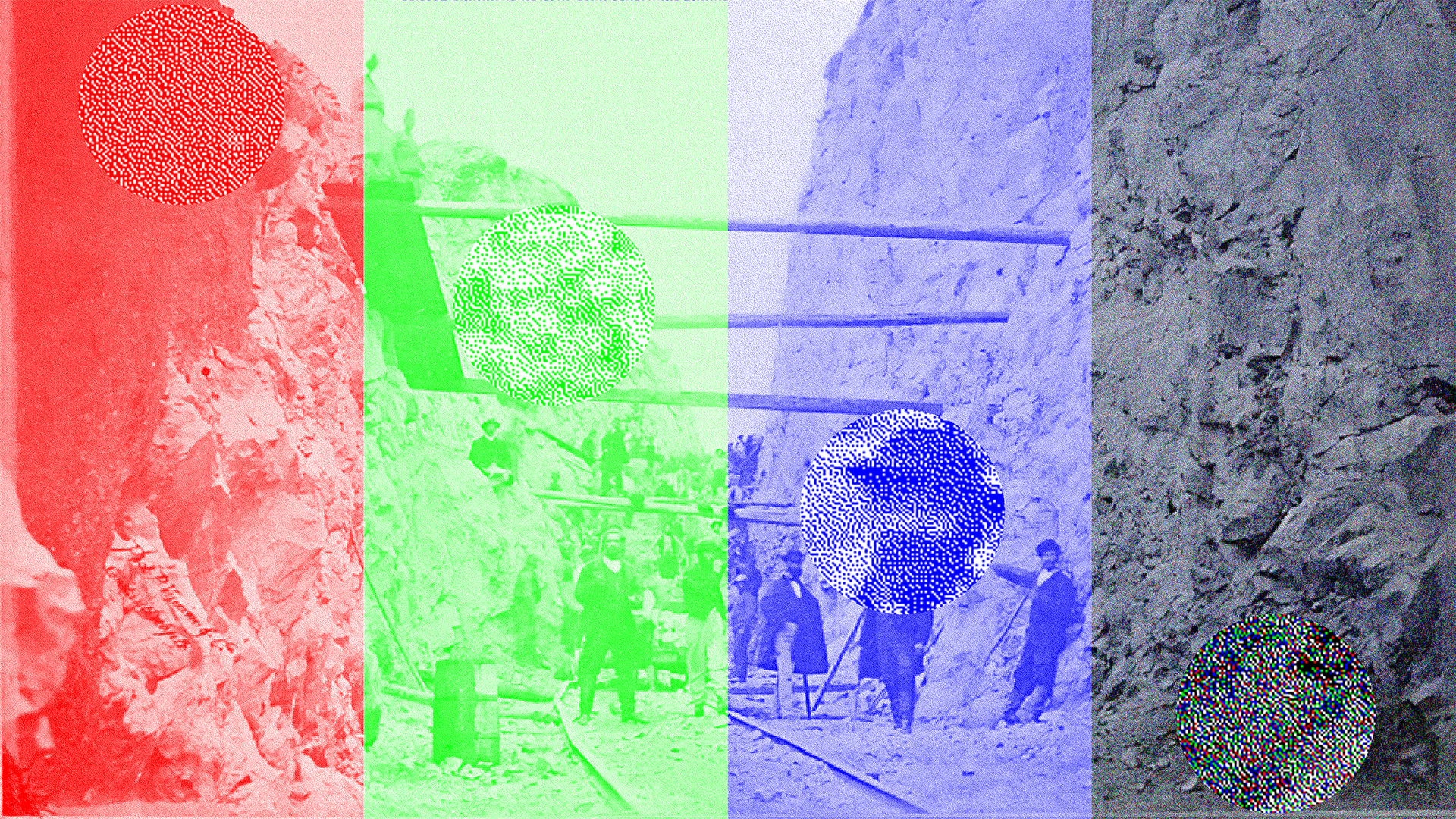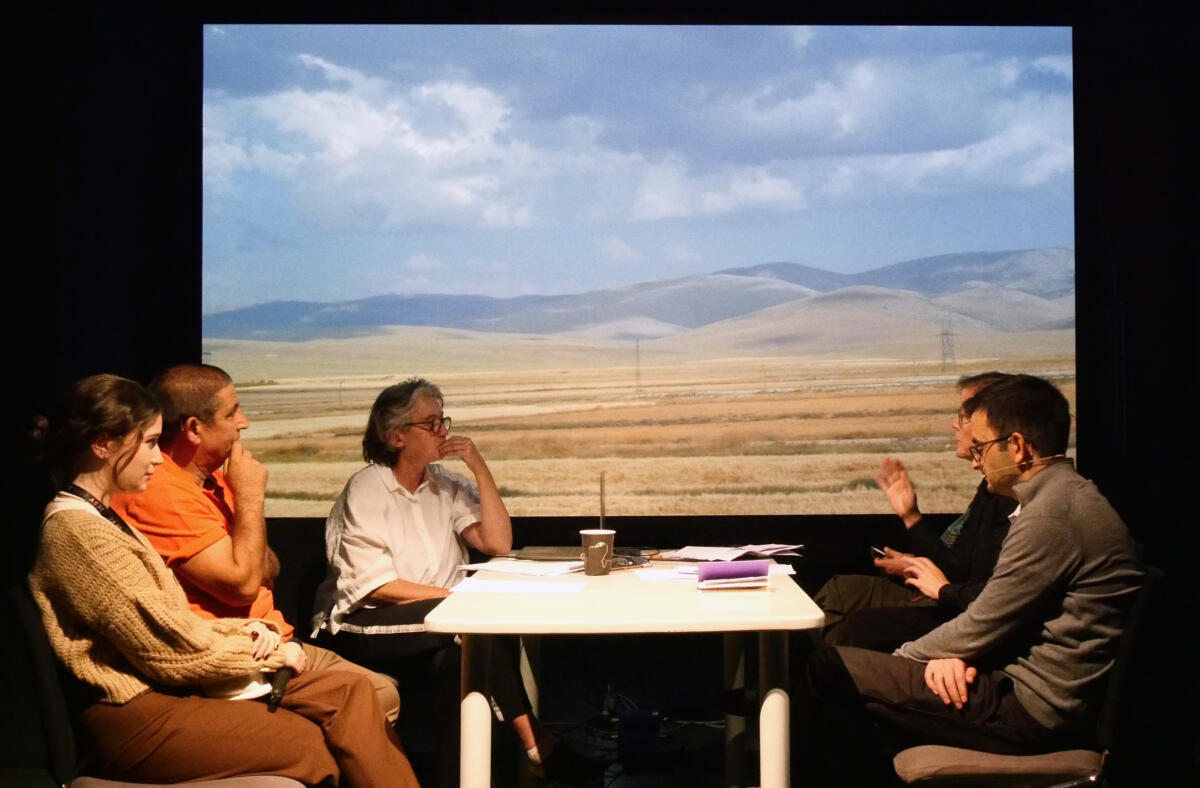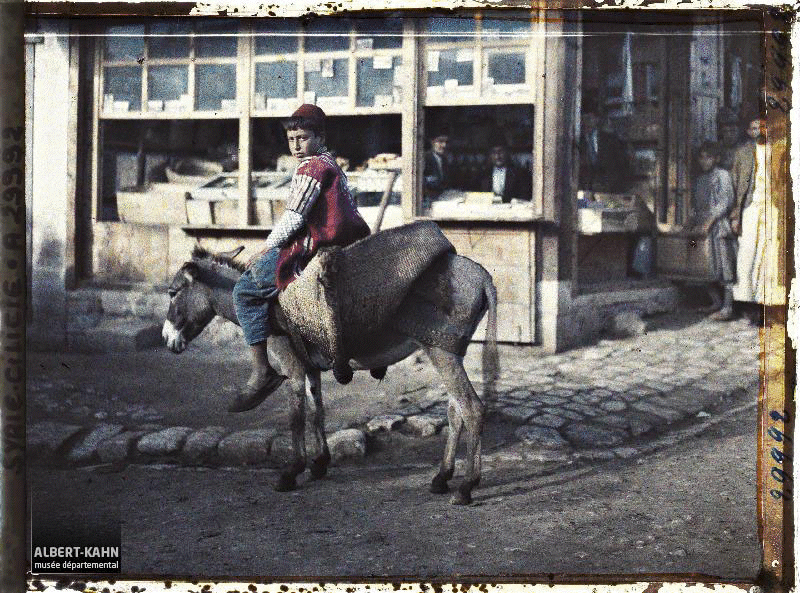Chromatic Noise: Mnemopolitics and Autochrome Witnesses
Chromatic Noise: Mnemopolitics and Autochrome Witnesses is a practice-led research on the historicity and materiality of digital image production in an analogue production environment. From early 20th century archival photographs of the Middle East / Minor Asia / Mesopotamian region, AI-generated memory images are created and set into motion, to critically investigate whether those can represent lost or hidden histories and related memories.

Introduction
Film as a transtemporal structure informs us how the analogue past forms the origins of a present profoundly subject to an image-driven capitalism. Precisely because they operate within the same system, a fundamental division between analogue and digital (film) might be considered irrelevant. Thus, the transtemporality of film allows us to resist the fatality of both technical and historical progressivity. Every image in the present is informed by and co-produced by the analogue origins of film. How do questions of transitoriness, archival value, and material witnessing apply to archival images? I intend to treat them as artificially intelligent, in the sense that they capture a memorial knowledge, in an understanding of AI as “a project to capture the knowledge expressed by individual and collective behaviour and encode it in algorithmic models to automate the most diverse tasks.” (Pasquinelli, 2023) This means that the memorial tasks of the archival images do not somehow become “untruthful” in the digital context, but rather reconstruct the vibrant unreliability of memory. How does one remember events that have been quite successfully continuously erased from the archival hard drives?
Industries of Denial

Video performance and conversations with Oktay Ince, Alper Sen, Schokofeh Kamiz, Alexandra Karina, Mehmet Polatel and others, IKSV Istanbul as part of 17th Istanbul Biennale 2022. Courtesy of the artists. Produced with the support of Tarabya Cultural Academy.
The artistic research ‘Industries of Denial’, together with Angela Melitopoulos, tells a counter-history of nation-building infrastructures during and after the decline of the Ottoman Empire.
The encompassing de-territorializing forces of modern infrastructure building at the beginning of the 20th century, and the emergence of PPPs (public-private partnerships) by the Germans (see Bagdadbahn and Deutsche Bank) destroyed situated knowledges as well as social, economic, and cultural exchanges. In the region of Anatolia and Mesopotamia, the remains and ruins of these once cosmopolitan cultural areas are gentrified for tourism, for cultural encounters devoid of the ‘missing people’. These quarters, in Izmir, Konya, Adana,… become part of that new object of mega infrastructural planning as a nation-building enterprise. Further east the earthquake of 2023 has erased the multi-cultural grounds and paved the way for further monoculture.
Ruins, stratifications, and excavations along the Baghdad Railway line between Istanbul and the Turkish-Syrian border render the train tracks as a visual axis, dividing line, and a cut through the landscape. The ruins and remnants along the railway point to the misconstruction of the Baghdad Railway for the modernisation of a nation-state through infrastructure.
Traces of the Asia Minor Catastrophe are still legible every day and everywhere in the region but are always excluded, repressed, and denied from the nation-state narrative – from the Turkish as well as from the Greek, and not the least from the European empire’s narrative. Denialism testifies to the insistent reality on Europe’s frontier and is tolerated like a cynical and artificial expression of social interrelations. We outline continuities and contingencies of German export of infrastructure building and its contribution to nationalist policies in the region.
Setting ‘Industries of Denial’ as the framework, ‘Chromatic Noise’ aims to contribute archival photographs and other archival material from the construction of the railway into the collaborative work, to create mnemonic noises in the visuality of denial.

Analogue ‘Zeitzeug*innenschaft’
Albert Kahn’s “Les Archives de la Planète” includes, among other things, more than 2000 colour photographs from the area of present-day Turkey. Taken between 1909 and 1925 using the Autochrome process, these images document not only the locations and protagonists of “the planet” but also, during their travels to the declining Ottoman Empire, the photographers sent by Albert Kahn became witnesses to the Great Catastrophe—the genocide against Armenians, Assyrians, and Greeks. Today, these colour photographs are archival remnants of a history that is still silenced and denied.
Revisiting these images and reworking them in between the analogue and digital workflows, the project seeks to ask to what extent technology criticism can intervene in the production processes of memory. How can the material components of the digital and digitised image make statements about its historicity and future social conditions?
The project seeks to question the material resources and, at the same time, to create a new cinematic work that does not achieve its visual sharpness through the multiplication of resolutions but rather through the multi-perspectival nature of the gaze.
About the researcher
Kerstin Schroedinger works with long-term research-based projects at the intersection of analogue film, video, sound and performance. Her projects are strongly concerned with the social and political formations of time-based media in their historicity and their materiality. She is currently University Researcher at the University of the Arts Helsinki with Chromatic Noise: Mnemopolitics and Autochrome Witnesses, a practice-led research on the historicity and materiality of digital image production from an analogue production environment. She holds a PhD from the University of Westminster, London (2016). Schroedinger’s works have been screened and exhibited at numerous contemporary art museums and events across the world, including at Contemporary Image Collective CIC Cairo, Whitney Museum of American Art New York, 17th Istanbul Biennial, 2nd Kyiv Biennial, and her works have been featured at international film festivals in Berlin, Hong Kong and Toronto, among many others.
The project is involved in the multimodal research Industries of Denial together with Angela Melitopoulos.
Angela Melitopoulos lives in Greece and has been making video essays, multi-screen installations, net-based editing projects, activist research, expanded cinema lectures, documentary films and music pieces since 1985. A retrospective of her work took place in June 2023 at the Museo Nacional Centro de Arte Reina Sofia. Melitopoulos studied at the Academy of Art in Düsseldorf (Nam June Paik) and at the Academy of Media Arts in Cologne (Valie Export) and holds a PhD from Goldsmiths, University of London. She taught as Professor of Media Art at the Royal Danish Academy of Fine Arts Copenhagen, at the University of Arts and Design in Karlsruhe, Germany and as a Senior Researcher at the Academy of Fine Arts Vienna.
Melitopoulos/Schroedinger have collaborated since 2019 and have a music project named Zonkey.
Find out more
Follow the project development on Instagram: chromatic_noise_
Industries of Denial at the 17th Istanbul Biennale 2022
Contact information for the project
-
Kerstin Schroedinger
- University Researcher, Doctoral program in fine arts, Academy of Fine Arts
- +358504438167
- kerstin.schroedinger@uniarts.fi
Project name
Chromatic Noise: Mnemopolitics and Autochrome Witnesses
Time
05/2024-04/2027
Funder
University Research Fellow Project, funded by Saastamoinen Foundation
Introduction
Film as a transtemporal structure informs us how the analogue past forms the origins of a present profoundly subject to an image-driven capitalism. Precisely because they operate within the same system, a fundamental division between analogue and digital (film) might be considered irrelevant. Thus, the transtemporality of film allows us to resist the fatality of both technical and historical progressivity. Every image in the present is informed by and co-produced by the analogue origins of film. How do questions of transitoriness, archival value, and material witnessing apply to archival images? I intend to treat them as artificially intelligent, in the sense that they capture a memorial knowledge, in an understanding of AI as “a project to capture the knowledge expressed by individual and collective behaviour and encode it in algorithmic models to automate the most diverse tasks.” (Pasquinelli, 2023) This means that the memorial tasks of the archival images do not somehow become “untruthful” in the digital context, but rather reconstruct the vibrant unreliability of memory. How does one remember events that have been quite successfully continuously erased from the archival hard drives?
Industries of Denial

Video performance and conversations with Oktay Ince, Alper Sen, Schokofeh Kamiz, Alexandra Karina, Mehmet Polatel and others, IKSV Istanbul as part of 17th Istanbul Biennale 2022. Courtesy of the artists. Produced with the support of Tarabya Cultural Academy.
The artistic research ‘Industries of Denial’, together with Angela Melitopoulos, tells a counter-history of nation-building infrastructures during and after the decline of the Ottoman Empire.
The encompassing de-territorializing forces of modern infrastructure building at the beginning of the 20th century, and the emergence of PPPs (public-private partnerships) by the Germans (see Bagdadbahn and Deutsche Bank) destroyed situated knowledges as well as social, economic, and cultural exchanges. In the region of Anatolia and Mesopotamia, the remains and ruins of these once cosmopolitan cultural areas are gentrified for tourism, for cultural encounters devoid of the ‘missing people’. These quarters, in Izmir, Konya, Adana,… become part of that new object of mega infrastructural planning as a nation-building enterprise. Further east the earthquake of 2023 has erased the multi-cultural grounds and paved the way for further monoculture.
Ruins, stratifications, and excavations along the Baghdad Railway line between Istanbul and the Turkish-Syrian border render the train tracks as a visual axis, dividing line, and a cut through the landscape. The ruins and remnants along the railway point to the misconstruction of the Baghdad Railway for the modernisation of a nation-state through infrastructure.
Traces of the Asia Minor Catastrophe are still legible every day and everywhere in the region but are always excluded, repressed, and denied from the nation-state narrative – from the Turkish as well as from the Greek, and not the least from the European empire’s narrative. Denialism testifies to the insistent reality on Europe’s frontier and is tolerated like a cynical and artificial expression of social interrelations. We outline continuities and contingencies of German export of infrastructure building and its contribution to nationalist policies in the region.
Setting ‘Industries of Denial’ as the framework, ‘Chromatic Noise’ aims to contribute archival photographs and other archival material from the construction of the railway into the collaborative work, to create mnemonic noises in the visuality of denial.

Analogue ‘Zeitzeug*innenschaft’
Albert Kahn’s “Les Archives de la Planète” includes, among other things, more than 2000 colour photographs from the area of present-day Turkey. Taken between 1909 and 1925 using the Autochrome process, these images document not only the locations and protagonists of “the planet” but also, during their travels to the declining Ottoman Empire, the photographers sent by Albert Kahn became witnesses to the Great Catastrophe—the genocide against Armenians, Assyrians, and Greeks. Today, these colour photographs are archival remnants of a history that is still silenced and denied.
Revisiting these images and reworking them in between the analogue and digital workflows, the project seeks to ask to what extent technology criticism can intervene in the production processes of memory. How can the material components of the digital and digitised image make statements about its historicity and future social conditions?
The project seeks to question the material resources and, at the same time, to create a new cinematic work that does not achieve its visual sharpness through the multiplication of resolutions but rather through the multi-perspectival nature of the gaze.
About the researcher
Kerstin Schroedinger works with long-term research-based projects at the intersection of analogue film, video, sound and performance. Her projects are strongly concerned with the social and political formations of time-based media in their historicity and their materiality. She is currently University Researcher at the University of the Arts Helsinki with Chromatic Noise: Mnemopolitics and Autochrome Witnesses, a practice-led research on the historicity and materiality of digital image production from an analogue production environment. She holds a PhD from the University of Westminster, London (2016). Schroedinger’s works have been screened and exhibited at numerous contemporary art museums and events across the world, including at Contemporary Image Collective CIC Cairo, Whitney Museum of American Art New York, 17th Istanbul Biennial, 2nd Kyiv Biennial, and her works have been featured at international film festivals in Berlin, Hong Kong and Toronto, among many others.
The project is involved in the multimodal research Industries of Denial together with Angela Melitopoulos.
Angela Melitopoulos lives in Greece and has been making video essays, multi-screen installations, net-based editing projects, activist research, expanded cinema lectures, documentary films and music pieces since 1985. A retrospective of her work took place in June 2023 at the Museo Nacional Centro de Arte Reina Sofia. Melitopoulos studied at the Academy of Art in Düsseldorf (Nam June Paik) and at the Academy of Media Arts in Cologne (Valie Export) and holds a PhD from Goldsmiths, University of London. She taught as Professor of Media Art at the Royal Danish Academy of Fine Arts Copenhagen, at the University of Arts and Design in Karlsruhe, Germany and as a Senior Researcher at the Academy of Fine Arts Vienna.
Melitopoulos/Schroedinger have collaborated since 2019 and have a music project named Zonkey.
Find out more
Follow the project development on Instagram: chromatic_noise_
Industries of Denial at the 17th Istanbul Biennale 2022
Contact information for the project
-
Kerstin Schroedinger
- University Researcher, Doctoral program in fine arts, Academy of Fine Arts
- +358504438167
- kerstin.schroedinger@uniarts.fi